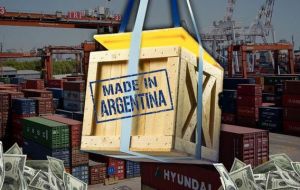MercoPress. South Atlantic News Agency
Argentina manages a US$ 1.02bn trade surplus in January
 The country posted a trade surplus of US$ 1.02 billion in January, from a surplus of US$ 373 million a year earlier, Indec said
The country posted a trade surplus of US$ 1.02 billion in January, from a surplus of US$ 373 million a year earlier, Indec said Argentina's economic activity expanded in December as retail sales and manufacturing advanced, while the country posted a trade surplus in January that almost tripled the surplus the same month a year earlier.
Activity increased a seasonally adjusted 0.2% in the December and contracted 0.3% from a year earlier, according to the monthly estimate released by Argentina's stats office Indec. In November, activity fell a revised 1.6% in the month and contracted a revised 2% from a year earlier.
The country posted a trade surplus of US$ 1.02 billion in January, from a surplus of US$ 373 million a year earlier, Indec said. Exports declined slightly to US$ 4.55 billion in the month from US$ 4.59 billion a year earlier, while imports fell to US$ 3.53 billion from US$ 4.21 billion in the same period.
The fledgling government of President Alberto Fernandez needs the economy to recover to boost tax revenue and help pay down the country's debt, which the IMF earlier this week said was unsustainable. The Fund called on the country's creditors to make a “meaningful contribution” to help restore the country's debt to a sustainable level.
Argentina, Latin America's third-biggest economy after Brazil and Mexico, has a long history of financial difficulties. The country has defaulted on debt at least eight times in the past 200 years and has received almost 30 IMF packages over the past six decades. The last major crisis occurred in 2001 when Argentina defaulted on about US$ 130 billion in debt, the largest default at the time.
Retail sales increased 1.6% in December, after falling 6% in November, while manufacturing activity gained 0.8% in the last month of last year following a decline of 4.8% a month earlier.




Top Comments
Disclaimer & comment rules-

-

-

Read all commentsThese promising economic results started building up from the very moment Alberto Fernandez took office early December.
Feb 23rd, 2020 - 06:44 pm 0In contrast, we remember well how Macri government officials (and some cheerleader participating in this forum) explained that “we got to wait till the next semester,” or then vice-president Gabriela Michetti's analogy “the light at the end of the tunnel,” the tunnel symbolizing the penury suffered by the Argentines and the light being a hypothetical, bright future.
It is true that the government of Alberto Fernandez will face huge challenges during its term; however, what's required is that steps in the right direction are taken and that the population understands the limitations the country faces in light of the unprecedented debt taken by the previous government that did not add up to the economy but was instead used for dubious purposes, capital flight being one of them.
Sounds good, but it would be unusual for a new government to have an effect so quickly. Did AF do something to make imports drop so drastically, or was it the natural result of inflation and depreciation of the currency?
Feb 23rd, 2020 - 10:42 pm 0Indeed. It is a short-term thing, partly based on better hopes encouraging citizens to spend a little more.
Feb 24th, 2020 - 01:50 am 0Other stimulants may be bonuses and pension increases granted to lower-income retirees as part of emergency measures taken by Alberto Fernandez, as well as the distribution of a card to lower-income families allowing for the purchase of (only) food items -- all or most of which is immediately spent, increasing retail sales.
As for the slight trade surplus, it is mostly a result of a steep reduction of imports as a result of the ongoing recession deepened by Macri's application of IMF-mandated measures expected to reduce the fiscal deficit.
As for the IMF declaration, I hear it is the first-ever time this organization has ever acknowledged that a debt is unsustainable, that cannot be repaid and called on private lenders to make a 'meaningful contribution.' Of course, the Fund is perfectly aware that it lent a record amount of money without a customary technical assessment to a clearly inefficient manager such as Mauricio Macri. The Fund also violated its own statutes when it granted the loan when the signs were clear that a significant portion of the funds were spirited out of the country thanks to the dismantling of regulations addressing capital flows.
Commenting for this story is now closed.
If you have a Facebook account, become a fan and comment on our Facebook Page!